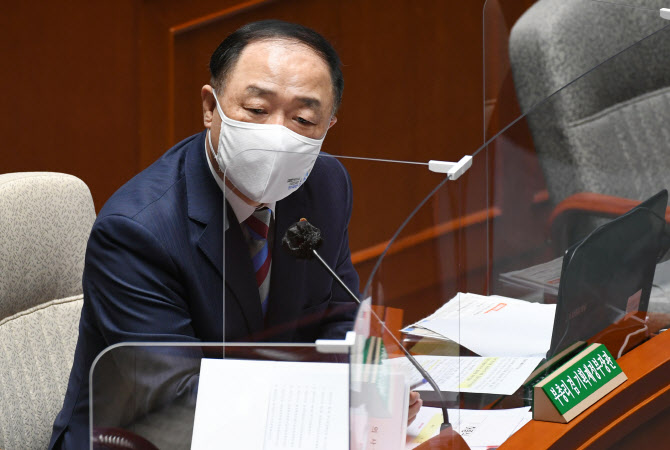There is a demand to pay disaster subsidies to farmers and fishermen, but the government is expressing difficulties. As the opposition party is predicting a cut in the budget for jobs along with restructuring expenditures, pain is expected to be inevitable during the adjustment process.
|
Demand for expanding disaster subsidies… Additional size of each standing committee↑
The Special Committee on Budget and Accounts of the National Assembly held a plenary meeting on the 18th and conducted comprehensive policy inquiries on the supplementary bill.
Prior to the previous day, seven of the 10 standing committees that were reviewing the supplementary bills voted for an increase of 3.30 trillion won. If the government-submitted supplementary bill (19.500 billion won including the fixed budget of 4.5 trillion won) is added, it amounts to 22.800 billion won.
Among the increased projects, the key is whether or not to provide disaster support for farmers and fishermen. The Agriculture, Forestry, Livestock, Food, Marine and Fisheries Committee has newly organized a project worth 1.5 trillion won with the provision of 1 million won per household of farmers, fishermen and foresters in the supplementary draft.
On that day, the National Assembly received fewer requests from lawmakers to support farmers and fishermen.
Rep. Kim Tae-heum said in the Planning and Finance Committee, “There are many blind spots such as eco-friendly farms (in the agriculture industry), but the damage is not properly analyzed and the farmers do not understand that they are subtracting (from the subject of direct support). He said, “Please review the victims so that they can support the victims as much as you expressed your stance in favor of it.”
The government said that it continues to support policies for farmers and fishermen, and showed a cautious stance on cash aid.
Hong Nam-ki, Deputy Prime Minister of Economy and Minister of Strategy and Finance, said, “The government has supported the flower and rural tourism sectors, and measures such as lowering interest rates and deferring principal repayment for farmers and fishermen.” “It was reflected in the budget), but because I am a farmer and fishermen, it is not appropriate to apply.”
There was also an opinion that other companies should also be included in the travel industry, which receives 2 million won support for business in crisis. Rep. Seo Il-joon of the People’s Strength suggested expanding the business in crisis, saying, “Only travel agencies are included in the travel industry, and cruise ships, recreational businesses, and campsite businesses are excluded.”
The government also left room for discussion about customized support rather than full support. Deputy Prime Minister Hong said, “We know that the tourism industry has suffered a lot of damage, and we will eliminate blind spots as much as possible by dividing into sub-classifications based on the data from the National Tax Service.” I will look again.”
|
Hong Nam-ki “If there is no post-corona countermeasure, credit rating risk”
If the number of targets for disaster subsidies increases, the additional budget will exceed 20 trillion won and the financial burden will increase further.
The preliminary committee chief expert said through the supplementary bill review report that the scale of fiscal response to Corona 19 is not large compared to that of major countries, and the proportion of direct fiscal expenditure is also low, but the scale of the supplementary bill itself is at a level larger than that of the past economic crisis.
Last year and until this year, the scale of the five additional additions was 81.8 trillion won, which is 3-4 times larger than the global financial crisis (2008-2009) 28.400 trillion won and the foreign exchange crisis (1998-1999) 21.5 trillion won.
As the market conditions such as the recent increase in government bond yields are deteriorating, we believe it is necessary to prepare for the increase in government bond issuance. Legislative Investigator Kim Min-jae said, “There is an inevitable aspect to cover the remaining portion with government bonds after making the most of relatively sound financial resources such as surpluses.” “As the government bond market conditions are becoming unfavorable to the issuer, it is necessary to reduce the cost of issuing government bonds as much as possible. I suggested.
Deputy Prime Minister Hong also stressed the importance of fiscal soundness, saying, “There is a concern about the Korean fiscal level by credit rating agencies recently, and if the financial stabilization and rehabilitation measures are not properly done after Corona 19 (credit level),” he stressed the importance of fiscal soundness.
The power of the people decided on policies such as reducing the issuance of government bonds and reducing the short-term job budget entirely through expenditure restructuring ahead of the review of the supplementary bill. Rep. Choo Gyeong-ho, a secretary of the Preliminary Committee, emphasized, “We should not make the premise that it is inevitable to cover government bonds,” and emphasized that “we can raise financial resources through restructuring of expenditures.”
Rep. Park Hyeong-soo of the same party also pointed out, “If only 10% of the 291 trillion won to be used autonomously in the government budget is saved, it is 29 trillion won.”
Regarding this, Deputy Prime Minister Hong said, “It’s just been two months past (this year), and most of it was considered necessary and reflected in this budget.” Replied.
Meanwhile, in the process of inquiries to the National Assembly, attention was focused on the claim of’additional 100 trillion won’. Representative Yong Hye-in of the Basic Income Party said, “Even if you pay 400,000 won per person on a quarterly basis, it is only 80 trillion won, and if you spend 20 trillion won to compensate for the loss of small businesses, you can spend about 100 trillion won.” I asked.
Regarding this, Ahn Il-hwan, the second vice minister of the Ministry of Science and Technology, said, “I am talking about national debt too easily without thinking about the burden of costs. When I think about paying back, who will pay it, how will it be?”


